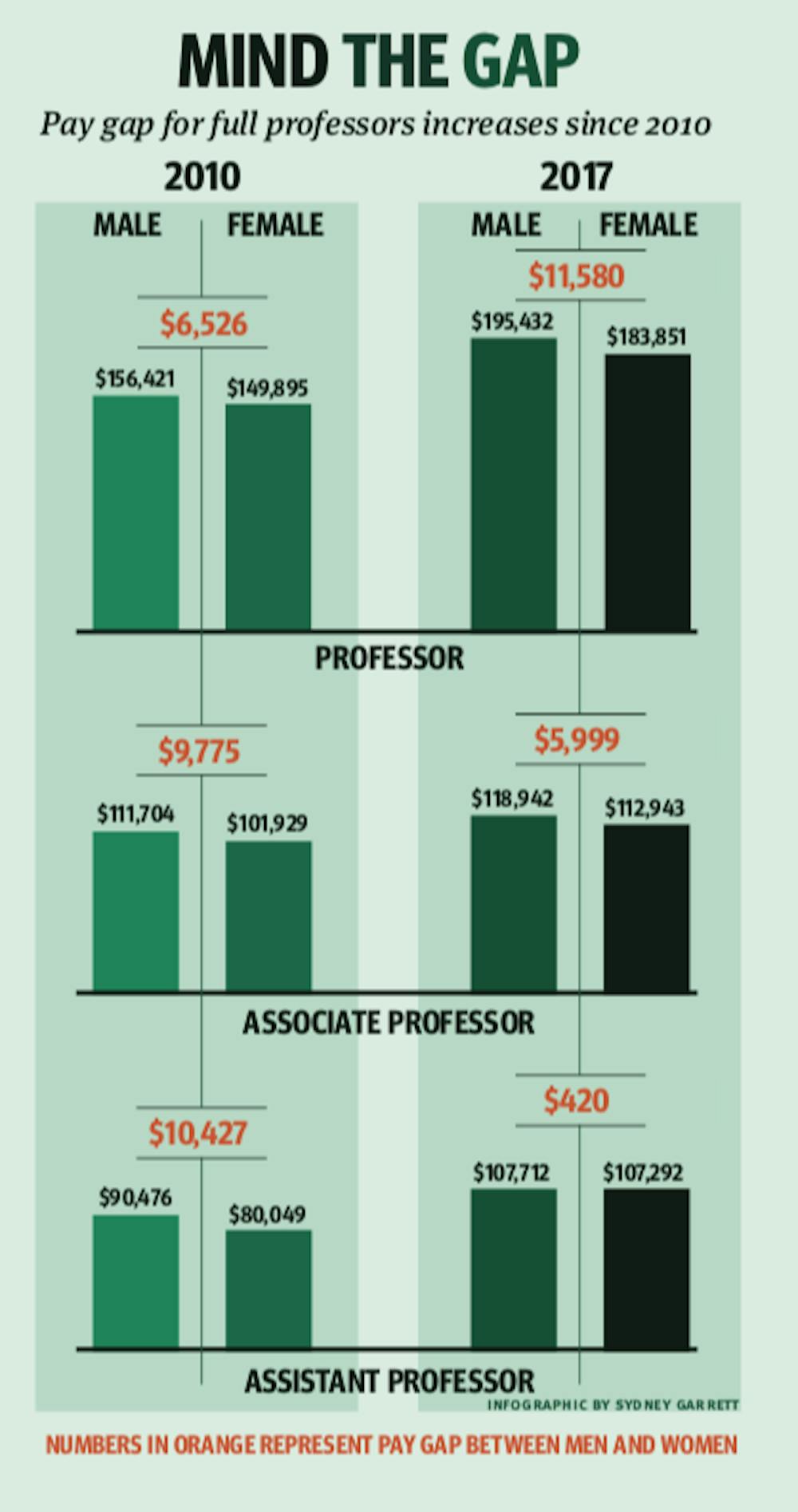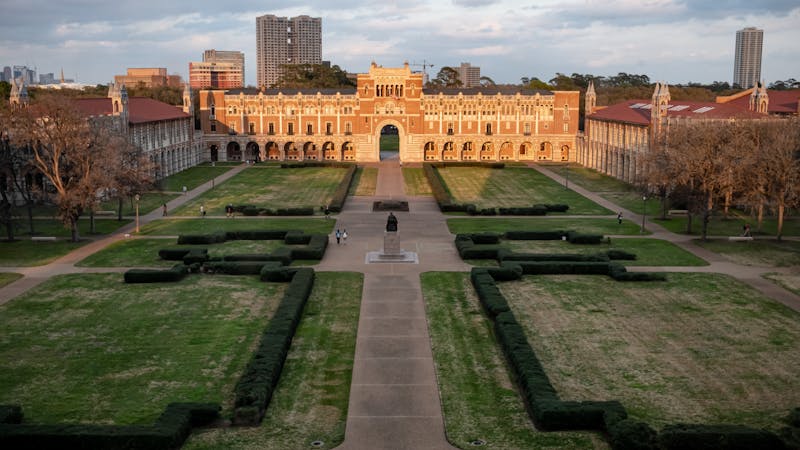Mind the gap: Pay gap for full professors increases since 2010

Female full professors at Rice earned an average of $11,580 less than their male counterparts during the 2017-18 academic year, according to data provided by Vice President for Finance Kathy Collins.
The data shows the pay gap has consistently increased for full professors over the last eight years. In 2010-11 the gap was $6,526, which rose to $9,244 in 2013-14 and $11,580 in 2017-18. In 2017, the Chronicle of Higher Education reported that nationwide faculty pay gaps are most pronounced at the full professor level, with male full professors earning on average $18,200 more than female full professors at four-year nonprofit colleges nationwide in 2015.
“This gap results in part from the smaller proportion of female faculty at the full level, as well as the shorter number of years on average for women at the full level,” Collins said in an email.
According to provost Marie Lynn Miranda, much of the pay gap remains as a result of former male administrators who have returned to faculty positions but retain higher salaries due to their previous leadership roles. An additional cause is the smaller proportion of women faculty in fields that “command higher salaries.”
Four male deans were counted in the 2017-18 averages, but not the 2013-14 averages, according to Collins.
Collins said the pay gap is only significant at the full professor level.
According to data provided by Collins, female associate professors made on average $5,999 less than their male counterparts during the the 2017-18 academic year. This is a decrease from 2013-14 when the gap was $11,626.
At the assistant professor level, the pay gap from the 2017-18 school year amounted to $420, about 22 times smaller than the pay gap of $9,232 in the 2013-14 academic year. In 2010-11, the pay gap for assistant professors was even larger, at $10,427.
“There is essentially no gap with assistant professors,” Collins said. “While a gap remains, we have made substantial progress in closing the gap at the associate professor level in the past few years and our work in this area continues.”
The provost’s office reviews salary discrepancies as part of the budget process to determine whether pay equity adjustments should be made, according to Miranda.
“During hiring season, we provide similar data [on faculty salaries],” Miranda said in an email. “We would point out discrepancies in offers that we see – except deans are acutely sensitive to these issues, and we rarely have any issues to raise.”
According to Collins, the significant pay gap at the full professor level can be partly attributed to disparities in the departments in which male and female faculty members work.
“Salary averages by gender may be skewed by departments that have higher than average salaries because of the field and by fields where women are not as represented as men,” Collins said. “Salaries in business and engineering, for example, [are] higher on average than in other fields.”
Females accounted for 26 percent of Rice’s business faculty in the fall of 2017, according to the Office of Institutional Research. In engineering, females made up 23 percent of the faculty.
Rice is currently working to increase both the number and proportion of female faculty and faculty of color at the university and in leadership positions at the university, according to Miranda. Miranda said in 2017, roughly 27 percent of current tenured and tenure-track faculty were female. However, of the new faculty who joined Rice in the fall of 2018, 48 percent were female.
At the Thresher’s Fall Academic Panel, Ken Whitmire, associate dean for academic affairs, said out of the six new faculty hired in the Wiess School of Natural Sciences last year, five were women.
Salary decisions at Rice are initially made by department chairs and deans of schools, accounting for merit, equity, retention, and promotion and tenure decisions, according to Collins. The provost then reviews salaries with respective deans to make final decisions. Collins also said when faculty receive tenure and promotion to higher rank, they receive, on average, a 10 percent salary raise.
“The university seeks to pay faculty equitably and commensurate with their performance,” Collins said. “The provost and deans review salaries case by case and as previously noted, the provost and deans are working to evaluate and address any gender-based pay gaps.”
Gender pay gaps are an issue at some of Rice’s peer institutions as well. At private universities like Duke University, female assistant professors made 85 cents to the male dollar in 2014, according to a Report to the Academic Council on Faculty Salary Equity.
Data from a report by the American Association of University Professors chapter at Wake Forest University showed that the gap among assistant professors ranged from $2,000 to $7,000 by department in 2012 — smaller than Rice’s gap of $9,232 in 2013-14 but larger than Rice’s 2017-18 gap of $420.
At Wake Forest University, female associate professors in the social sciences earned approximately $2,000 more on average than male associate professors in the department.
Miranda said the university has taken on concentrated efforts to ensure more diverse applicant pools in the faculty search process, efforts that include both women and people of color.
“Pay equity is very important to me as provost, as well as to the academic leadership at Rice more broadly,” Miranda said.
More from The Rice Thresher

Rice accepts 13% of record-setting ED applications
Rice accepted 13.2% of Early Decision applicants in its first round of admissions for the class of 2029, said Yvonne Romero da Silva, vice president for enrollment. With 2,970 total applicants, this year saw yet another record-high; a 3% increase from last year’s previous high of 2,886. An additional 100 students gained admission through the Questbridge National College Match program, an uptick from last year’s 77.

Students reject divestment proposals
The student body voted to pass S.REF 01, which asks the Rice Management Company to disclose all of its holdings investments, but rejected the remaining divestment proposals. While every ballot measure gained a majority of votes in favor, the remaining three did not achieve the two-thirds majority required to pass.

Student organizations form coalition to support SA referenda
Four Student Association referenda open for the general student body vote today at noon. The referenda call for disclosure of Rice Management Company holdings and divestment from entities that profit off the Israel-Hamas war. The referenda also ask that Rice release a statement condemning genocide and materially support anti-colonial scholarship. Voting will close Dec. 11 at noon and the results will be published the next day. For the referenda to pass, a two-thirds majority with a 20% student body turnout is needed.

Please note All comments are eligible for publication by The Rice Thresher.